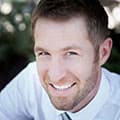Jamen is a Data Scientist at Westfield Labs in San Francisco. He previously worked for several cutting-edge companies (such as Adobe) managing vendors and logistics before deciding to focus on data analytics. Jamen was able to leverage the DataCamp platform to gain the skills he needed to launch a new career in Data Science.
What drew you to data science?
I really like that there's always an answer when analyzing data—or, at least, a way to make informed decisions. I've worked at places in the past where many decisions were based on gut feelings, judgment calls or simply what was done in the past. I never liked that approach. I wanted to pursue a career where good data and proper analysis were the guides to making decisions.
What was your experience with data science before starting with DataCamp?
I used STATA as an economics student in college, but DataCamp was was my first exposure to solutions like R. I knew I needed to learn R, Python, and SQL, but I had zero experience before DataCamp. I started the intro courses and haven't looked back!
What do you like about DataCamp?
Before I started with DataCamp, I tried some other online courses. For someone with no experience with GitHub, R, Python, or many of the other tools common in data science, it was really hard to get going. DataCamp provided a much more succinct approach than the other courses I had tried, and I loved how the course progressed logically using a step-by-step path. It was a much more intuitive interface and the instructors were very good–they explained things well. I felt like I was learning skills I could actually apply to my professional goals. Plus, I thought a price point of $39 per month was great! DataCamp offered much more for my money than other resources I was looking at.
I also really liked how thorough and all-inclusive the courses were. From learning basic syntax to building meaningful summaries and groupings in dplyr to visualization and R markdown, DataCamp really teaches you many different parts of R that would be difficult to learn otherwise. It really helped me make steady, meaningful progress.
Can you talk about your path from learning on DataCamp to landing a job as a data scientist?
I previously worked at Adobe managing vendors and logistics, but I left because I wanted to shift into data science. I knew I had to learn Python, R, and SQL, which I had zero experience with, so I started taking tons of DataCamp courses.
I wanted to have some data science things on my resume that I could point to and say, "Hey I've done this." One of those items came from a data set that was interesting and would showcase the skills I developed by using DataCamp, so I used it as an opportunity to show what I can do. It was very much an end-to-end project where I went from cleaning the data, calculating some basic stats, creating some segments, and ultimately doing some significance testing and visualizations.
Then I updated my resume with my new skills and projects and started to interview. I had some really good interviews–some with startups, one with Pinterest and a few other companies. I got an interview with Westfield, which is where I am at currently. They felt I had a good understanding of data science methodology, but weren't sure I had the experience with R they were looking for. I pulled out my computer and showed them the project I did with the skills from DataCamp and I got a job offer a few days later. Just to be clear, the only place I've ever learned R is from DataCamp. It was essential in getting my job, which was my break into data science."
What were the greatest challenges for you starting a career in data science?
First of all, the guts to take that leap and jump to a new career. It's a scary thing. In my case, I left a good job with a company that I really respected. That was tough. I continually found myself wondering whether this was the right thing to do, how long it was going to take, would I have enough money, all those things. And then once I started getting into it, I realized there was a lot more that I needed to learn to fully shift my career. But finding good resources, like DataCamp, helped me feel like I was progressing, which alleviated a lot of uncertainty.
What advice do you have for someone just starting out with DataCamp?
As someone coming from a background very different from data science, I'd say that it's important to focus. Don't get overwhelmed by all of the technologies and terminology—it's easy to hear things like "Pandas", "Scikit-learn", "dplyr" and "boosting" and be paralyzed by what seems like a mountain of things you don't know. Start in a place that is specifically made for beginners, and gradually build from there. Don't feel like you have to know it all immediately. That's what I love about DataCamp—it gives beginners a great place to start, and provides a clear, effective path forward.
I also felt like going through as many DataCamp courses as possible really helped me. Not only did it allow me to put R on my resume, I could also confidently name specific packages like ggplot, ggvis, tidyr, and dplyr, which I think helped me stand out a bit further."
